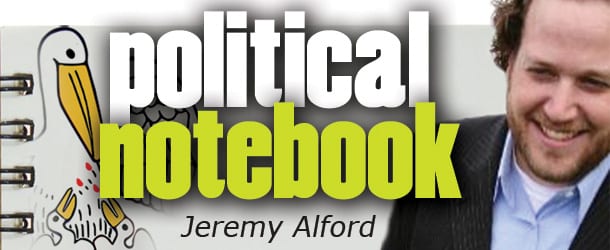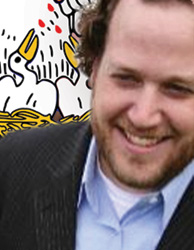By Jeremy Alford & Mitch Rabalais
“I don’t think there is an agreement in concrete. I think there is an agreement to proceed.”
That’s what Senate President John Alario told the dean of the Capitol press corps, Jim Beam, last week, before the year’s first special session convened.
Now, of course, legislators are pacing the carpeted floors of the House and Senate, knowing full well that the only thing concrete in that building is what resides beneath their feet.
Alario, who turns 75 this fall, accurately described the ongoing mood in Baton Rouge using just a few words. There really hasn’t been much coming out of state government this term, other than an “agreement to proceed.”
In other words, the Capitol’s players are leaning forward, albeit in between bouts of intramural bickering and stalled policies. But where, exactly, are they leaning and proceeding?
That’s an excellent question. The truth is no one knows; at least not right now, during the opening days of the Legislature’s first extraordinary session of 2018.
This policymaking gathering is actually the seventh legislative session to be held in Baton Rouge during the past 24 months — including five special sessions called personally by Gov. John Bel Edwards. That figure, quite frankly, is ridiculous. And don’t let anyone tell you otherwise.
That many sessions should not have been needed to avoid structural budget and tax alterations in exchange for temporary solutions. But here we find ourselves, back at it again — debating familiar topics that previously bombed with the same factions taking similar stances.
“If Bill Murray were doing another movie, maybe Groundhog Day 2, he’d play Gov. Edwards, because it’s the same story every year,” radio show host Jim Engster said recently on WAFB-TV, where he serves as a political analyst.
Yet despite this well-worn record, there’s no certainty or predictability in the process at the Capitol these days. (Or during the past two years.) That means the chances for failure or inaction are, unfortunately, heightened. Under such a gloomy scenario, the governor will surely act quickly to blame the House, and Republicans will counter by painting Edwards as the culprit.
Hopefully they’ll realize, sooner than later, that no one will look good if the special session goes belly-up.
From the first organizational session of the Legislature, held in January of 2016, uncertainty has plagued the body and the administration. Only a small circle of insiders could have guessed, prior to the organizational session, that representatives were going to elect Speaker Taylor Barras — against the governor’s wishes — to lead the lower chamber.
It’s also doubtful that anyone could have predicted that the first special session of the term would have concluded in cinders, and with the Senate president releasing tears (actual tears) of frustration. And no one expected that the subsequent regular session that year, also the first of the term, would adjourn without lawmakers adopting an annual construction bill.
And the beat goes on. Another session led to yet another, leaving burned bridges and bruised egos in their wakes. Deadlines were blown, substantive debates were shelved, and few close to the process — from reporters and lobbyists to undersecretaries and citizen activists — had any inkling of what was going to happen next.
Those same folks still have no idea what’s going to happen with the recently convened special session. So, what’s the end game? It’s about politics, to some extent.
In a recent Advocate opinion column, Jeff Sadow, an associate professor of political science at LSU-Shreveport, suggested that the maneuvering of Republican lawmakers could go a long way in creating trouble for the governor’s re-election bid in 2019. By extending some temporary tax measures, he noted that the “GOP can buy enough time for voters to deny (Edwards) a second term. With his departure, genuine tax reform and right-sizing of government can commence.”
For his part, Edwards is playing some angles, as well. He’s expected to push a handful of fiscal proposals that range from having no shot at passage to no chance of even being heard. The prospects are poor, for example, for the governor’s push for compressed income tax brackets, just as they were for his commercial activity tax plan last year.
When it’s all said and done, the governor’s boosters hope he’ll be able to tell voters that he presented the Legislature, particularly the House, with solutions. And Edwards will no doubt add that GOP legislators rejected those solutions, even though many of them were doomed from the beginning.
The uncertainty and political tomfoolery should make all of us question everything that’s coming out of the Capitol these days. In his opinion column, Ouachita Citizen publisher Sam Hanna hinted as much, adding that the world probably won’t end this spring if lawmakers balk at the governor’s tax proposals. “For weeks, my fellow Louisianians, we’ve been told all hell would break loose and the sky would fall and the Mississippi River would flow northward and the Gulf of Mexico would dry up if the Legislature didn’t raise about $1 billion in taxes to fix the budget for the 2018-2019 fiscal year,” Hanna wrote.
To be certain, the Mississippi River isn’t going to change directions and the Gulf will remain wet. As far as what the Legislature will do, though, your guess is as good as mine.
Another Henry In The House?
In 2019 election news, the chief of staff to U.S. House Majority Whip Steve Scalise, R-Jefferson, and the brother of state Appropriations Chairman Cameron Henry, R-Metairie, may seek the seat that Rep. Henry will be vacating at the end of this term.
Should he decide to run and then win, Charles Henry would actually be making a return to the Capitol in Baton Rouge. He has been with Scalise since the whip’s state House days.
Friends say Charles Henry, an attorney, is open to the idea and interested. But he’s 100 percent focused on his job with Team Scalise and has the question on the back burner. For now.
LaPolitics is tracking more than 50 legislative seats ahead of next year’s elections (lapolitics.com/2019-legislative-watchlist/).
Understanding Scalise’s Fundraising
If you want to see the kind of fundraising boost that comes along with being a member of the congressional leadership, look no further than the various campaign finance reports connected to U.S. House Majority Whip Steve Scalise, R-Jefferson.
While a review of the standard candidate committees shows a somewhat robust fundraising operation for Scalise, that’s only a small part of a larger picture.
The joint fundraising committee structure employed by Scalise’s team offers not only an inside look at modern campaigning, but also serves as a reminder of why the whip’s combined efforts far outpace those of his Louisiana contemporaries.
His primary fundraising vehicle, the Scalise Leadership Fund, serves as a clearinghouse for everything moving in and out. It feeds Scalise for Congress, the Eye of the Tiger Political Action Committee (Scalise’s leadership PAC) and the National Republican Congressional Committee (the GOP hub for protecting incumbents and recruiting new conservative members).
The contributions last year to the Scalise Leadership Fund alone nearly topped $4.5 million. When coupled with other contributions deposited directly into the other accounts that are part of the joint fundraising committee, the total haul for Scalise in 2017 came to more than $5 million.
Political History: Dutch And The No-Roll Mardi Gras
Throughout history, only cataclysmic events such as invading Yankees, Yellow Fever and World Wars have been able to stop the annual revelry of Mardi Gras in New Orleans. But in 1979, a political firestorm led to a cancelation of the Crescent City’s celebration of Fat Tuesday.
After less than one year in office, Mayor Dutch Morial was facing daunting fiscal problems. Struggling to make the massive municipal payroll, Morial and the City Council decided to reform the salary structure for city workers. Their plan called for a 5-percent pay raise, but with a reduction in benefits and an increase in the number of hours in the work week.
Seeing Morial’s plan as unfair, city employees were outraged and began talking of a work stoppage. Union organizers for the police department planned their action for the Carnival season, knowing that the pressing need for extra officers with the influx of tourists and crowds would give them leverage in negotiations.
However, the talks reached an impasse when the city refused to reinstate benefits.
On Feb. 8, 1979, with two weeks to Mardi Gras, the New Orleans Police Dept. went on strike. Morial initially threatened to fire any officer who didn’t report to work, while then-Gov. Edwin Edwards called out the National Guard and State Police to patrol the city.
With their backs against the wall, Morial and the City Council tentatively agreed to some of the demands and the officers returned to work. Teamsters Union officials flew down to help the police with the negotiations, but the talks got bogged down again.
On Feb. 16, the NOPD went on strike for the second time. Edwards recalled the State Police and National Guard to the city, but warned officials that they were ill-equipped to handle the crowds and parades of Mardi Gras. In response, Morial cancelled the first week of festivities.
Supporting Morial, the remaining Krewes announced they would be suspending activities or relocating to suburban Jefferson, St. Tammany and St. Bernard Parishes. Locals were outraged, but the majority blamed the police and the Teamsters Union.
The streets of New Orleans were empty on Mardi Gras Day in 1979. The strike ended days later, with the police winning only nominal concessions from the city.
They Said It
“I have no confidence in anything right now.”
— State Rep. Ted James, D-Baton Rouge, on the upcoming special session, in The Times-Picayune
“You can’t fake the numbers.”
— State Rep. Lance Harris, R-Alexandria, on the governor’s proposed budget, on KEEL radio.
For more Louisiana political news, visit www.LaPolitics.com or follow Jeremy Alford on Twitter @LaPoliticsNow.














Comments are closed.